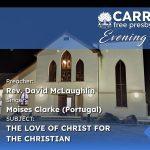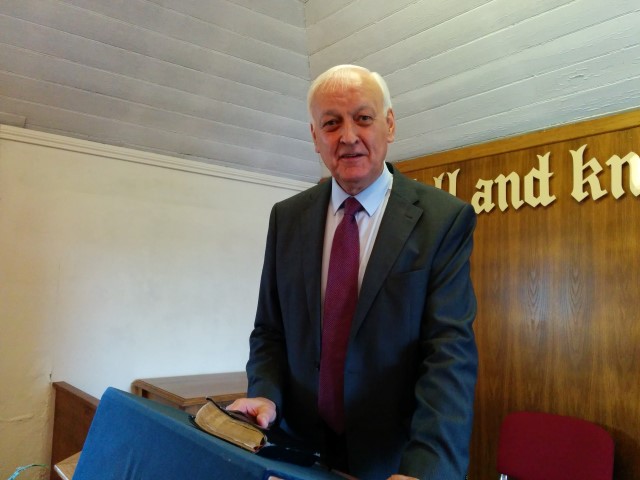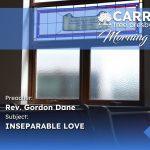Date: SUN 7:00 PM 29th June 2025
Preacher: Rev. David McLaughlin
Bible Reference: Hosea 11:4
I drew them with cords of a man, with bands of love:
and I was to them as they that take off the yoke on their jaws,
and I laid meat unto them.
Sermon Summary: Hosea Chapter 11 – Drawn with Bands of Love
Scripture Focus: Hosea 11, with emphasis on verse 4: “I drew them with cords of a man, with bands of love, and I was to them as they that take off the yoke of their jaws, and I laid meat unto them.”
Introduction and Context (0:00–4:55)
The sermon, delivered from Hosea Chapter 11, explores God’s relationship with His people, using the historical and prophetic context of Hosea’s ministry (770–725 BC). The preacher draws a parallel between Hosea’s marriage to Gomer, a prostitute, and God’s covenant relationship with unfaithful Israel. This marriage symbolizes God’s persistent love despite Israel’s idolatry and rebellion. The book of Hosea conveys three key messages:
- Relationship (Hosea 1–3): God’s covenant love, depicted as a marriage, despite human unfaithfulness.
- Judgment (Hosea 4–10): God’s righteous response to sin and rebellion.
- Mercy (Hosea 11–14): God’s compassionate love and desire to restore His people.
The sermon centers on Hosea 11:4, posing the question: “Are you drawn with the bands of love?”
Key Themes and Exposition (4:55–34:10)
The preacher organizes the sermon around four key points derived from Hosea 11:4, emphasizing God’s love, grace, and provision for His people.
- The Principle Presented: God’s Drawing Love (11:53–20:15)
- Implication: Humanity is naturally separated from God, lost in sin, idolatry, and self-will (Isaiah 53:6). People are resistant to God, dead in sin, and unable to come to Him without divine intervention.
- Instruction: God draws people not with force or fear but with “cords of a man, with bands of love”—a gentle, gracious, and humane approach. This drawing is rooted in love, as seen in scriptures like John 6:44 (“No man can come to me, except the Father which hath sent me draw him”) and John 12:32 (“I, if I be lifted up from the earth, will draw all men unto me”).
- Illustration: The preacher compares God’s drawing to a young man wooing a disinterested partner, emphasizing the contrast between human rejection and God’s persistent love. This love is exemplified in Christ’s sacrifice (Galatians 2:20; 1 John 4:9–10), which overcomes resistance through its sweetness and power.
- Application: The preacher asks if listeners have felt God’s drawing through sermons, testimonies, or life circumstances (e.g., illness, loss), urging them to respond to this divine pull.
- The Person Mentioned: God Himself (20:15–24:27)
- Who Draws: The “I” in Hosea 11:4 is Jehovah, the Lord Himself, who personally initiates the drawing process.
- What He Draws From: God draws people from sin’s penalty, power, and pleasure; from unbelief to faith; and from self-will to His will.
- Who He Draws To: He draws people to His Son, Jesus Christ, the only one who can meet human needs (John 8:32).
- How He Draws: Through the Holy Spirit, who moves hearts and minds, akin to a magnet drawing iron shavings. This spiritual movement creates a desire for salvation, often sparked by love rather than fear (Romans 5:5).
- Significance: The preacher emphasizes the overwhelming, substitutionary, and saving love of God, which constrains believers to live for Him (2 Corinthians 5:14).
- The Power Exercised: Liberation from Bondage (24:27–29:15)
- Imagery: The phrase “as they that take off the yoke of their jaws” evokes the image of an ox freed from a burdensome yoke, symbolizing Israel’s liberation from Egyptian slavery and, spiritually, humanity’s freedom from sin’s bondage.
- Relevance: Sin enslaves (e.g., alcoholism, drug addiction, pride), bringing pain and judgment. Christ’s power lifts this yoke, offering relief, rest, and freedom (“If the Son shall make you free, ye shall be free indeed,” John 8:36).
- Application: The preacher calls for prayer for those in bondage (e.g., addicts, gamblers) and urges listeners to cry out for salvation, emphasizing that freedom comes through recognizing one’s need and receiving Christ.
- The Provision Promised: Spiritual Sustenance (29:15–34:10)
- Provision in Context: The phrase “I laid meat unto them” refers to God’s provision of manna and quail for Israel in the wilderness (Psalm 78:24–25). Spiritually, it signifies the abundant blessings Christ provides to believers.
- Spiritual Feast: These blessings include:
- Forgiveness: A full, free, and forever pardon for all sins (Hebrews 10:17; Psalm 32:1–2).
- Access to God: Bold access to the throne of grace (Hebrews 4:16).
- Adoption: Believers are adopted into God’s family as His children.
- Peace: Peace with God through justification (Romans 5:1) and the peace of God that surpasses understanding (Philippians 4:7).
- Holy Spirit: Indwelling, guiding, and empowering believers for a vibrant Christian life.
- Illustration: The preacher likens these blessings to a lavish feast, far surpassing physical sustenance, fulfilling every spiritual need.
- Application: The preacher asks if listeners have experienced this provision, urging them to embrace God’s rich resources in Christ.
Conclusion and Application (32:59–34:47)
The sermon concludes by reiterating the question: “Are you drawn by the bands of love?” The preacher calls listeners to reflect on whether they have:
- Recognized God’s drawing through His love and Spirit.
- Responded to the Person (God) who draws them to Christ.
- Experienced the power of liberation from sin’s yoke.
- Received the abundant provision of God’s grace.
The sermon closes with a prayer that God would apply His Word in a saving way, encouraging listeners to seek salvation and embrace the “feast of good things” offered through Christ.
Key Takeaway: Hosea 11:4 reveals God’s heart of love, drawing sinners gently and graciously to Himself through Christ, offering freedom from sin and abundant spiritual provision. The preacher passionately urges listeners to respond to this divine love and experience its transformative power.
Subscribe to the podcast here:
Spotify Podcasts | Apple Podcasts | Pocket Casts
Email | RSS | more information here







